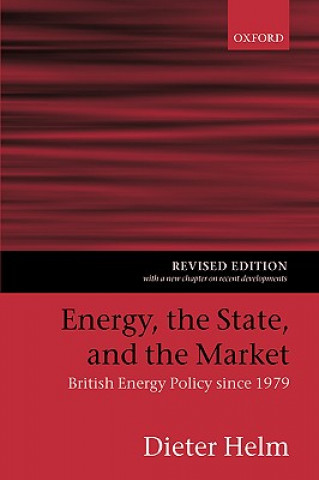
Kód: 04530792
Energy, the State, and the Market
Autor Dieter Helm
The transformation of Britain's energy policy in the last two decades has been more radical than any such change in developed economies. Since 1979 the great state energy monopolies created after the Second World War have been pri ... celý popis
- Jazyk:
 Angličtina
Angličtina - Vazba: Pevná
- Počet stran: 476
Nakladatelství: Oxford University Press, 2003
- Více informací o knize

Mohlo by se vám také líbit
-

Tudor Frontiers and Noble Power
6481 Kč -

Key Concepts in Community Studies
1026 Kč -

Discrete Algorithmic Mathematics
4224 Kč -

We're Going on a Bear Hunt in Turkish and English
343 Kč -

Absolute Risk
254 Kč -

Muslim World
2339 Kč -

Teaching in a Special Education Classroom
363 Kč
Dárkový poukaz: Radost zaručena
- Darujte poukaz v libovolné hodnotě a my se postaráme o zbytek.
- Poukaz se vztahuje na celou naši nabídku.
- Elektronický poukaz vytisknete z e-mailu a můžete ihned darovat.
- Platnost poukazu je 12 měsíců od data vystavení.
Více informací o knize Energy, the State, and the Market
Nákupem získáte 475 bodů
 Anotace knihy
Anotace knihy
The transformation of Britain's energy policy in the last two decades has been more radical than any such change in developed economies. Since 1979 the great state energy monopolies created after the Second World War have been privatised and made subject to competition. Images of Arthur Scargill and the miners' strike of the 1980s remain vivid, but what effect has the new market philosophy had on Britain's energy industries? Since 1979 the National Coal Board, British Gas and the Central Electricity Generating Board have all been broken up. Energy trading, electricity pools, auctions and futures markets first developed, but they failed to solve the old energy policy problems of security of supply and network integrity, and the new ones of the environment and reliance on gas. The government introduced a new regulatory regime as a temporary necessity but regulation did not wither away, rather it grew to be more pervasive. Changing the ownership of the industries did not reduce the government's involvement, it simply changed its form. The 1980s and 1990s were years of energy surpluses and low fossil-fuel prices. There was little need to invest, and much of the investment in the so-called dash for gas was artificially stimulated. The new owners sweated the assets, and engaged in major financial engineering. Takeovers consolidated the industry into a smaller number of dominant firms. As investment priorities became more urgent, with the environmental pressures of climate change and the gradual switch to imported gas, the market philosophy was found wanting. Energy policy could not rely solely on the market. And it is the government which finds itself responsible for resolving the core issues of energy policy. Helm's book tells this story. It is a major study of the new market approach to energy policy in Britain since 1979. It describes the miners' strike, the privatisations of the gas, electricity, nuclear generation, and coal industries, and looks at events such as the dash for gas, regulatory failures in setting monopoly prices, and the takeovers and the consolidations of the late 1990s. Helm sets out the achievements of the new market philosophy, but also analyses why it has ultimately failed to turn energy industries into normal commodity businesses.
 Parametry knihy
Parametry knihy
Zařazení knihy Knihy v angličtině Economics, finance, business & management Business & management Ownership & organization of enterprises
4754 Kč
- Plný název: Energy, the State, and the Market
- Podnázev: British Energy Policy since 1979
- Autor: Dieter Helm
- Jazyk:
 Angličtina
Angličtina - Vazba: Pevná
- Počet stran: 476
- EAN: 9780199262038
- ISBN: 0199262039
- ID: 04530792
- Nakladatelství: Oxford University Press
- Hmotnost: 832 g
- Rozměry: 242 × 165 × 33 mm
- Datum vydání: 13. February 2003
Oblíbené z jiného soudku
-

Zero to One
267 Kč -

E-Myth Revisited
493 Kč -

Barbarians At The Gate
306 Kč -

How the Mighty Fall
517 Kč -

When Cultures Collide
804 Kč -

Unscripted
501 Kč -

The Market Gardener
605 Kč -

Built To Sell
303 Kč -

Ultimate Sales Letter, 4th Edition
278 Kč -

Traction
485 Kč -

Side Hustle
306 Kč -

What I Learned Losing a Million Dollars
590 Kč -

King of Capital
422 Kč -

Mastering the Rockerfeller Habits
424 Kč -

How to Make Millions with Your Ideas
412 Kč -

Lost and Founder
464 Kč -

Automatic Customer
303 Kč -

Hunch
276 Kč -

Catering Business
239 Kč -

Etsy Empire
341 Kč -

How to be a Wedding Planner
939 Kč -

Crush It!
389 Kč -

Mastering The Vc Game
391 Kč -

Starting an Online Business All-in-One For Dummies
642 Kč -

Complete Guide to Mergers and Acquisitions - Process Tools to Support M&A Integration at Every Level 3e
1693 Kč -

Wealthy Barber, Updated 3rd Edition
349 Kč -

Traction
598 Kč -

Intel Trinity
702 Kč -

Run Your Own Corporation
507 Kč -

Mergers, Acquisitions, and Corporate Restructurings
1845 Kč -

The Franchising Handbook
463 Kč -

Art of M&A, Fifth Edition: A Merger, Acquisition, and Buyout Guide
2823 Kč -

New Business Road Test, The
811 Kč -

Strategic Planning for Public and Nonprofit Organizations - A Guide to Strengthening and Sustaining Organizational Achievement 5e
1516 Kč -

How To Deal In Antiques, 5th Edition
830 Kč -

Start Your Own Screen-Printing Business
474 Kč -

Family Wealth Continuity
1036 Kč -

Most Successful Small Business in The World
492 Kč -

Electrification of Russia, 1880-1926
689 Kč -

How to Style Your Brand
810 Kč -

Urban Farmer
605 Kč -

Seven-Day Weekend
357 Kč -

Lean Analytics
1231 Kč -

She Means Business
357 Kč -

Machine, Platform, Crowd
442 Kč -

Start-up of You
306 Kč -

Business for Bohemians
306 Kč -

Ultimate Guide to Pay-Per-Click Advertising
452 Kč -

Corporation
303 Kč
Osobní odběr Praha, Brno a 12903 dalších
Copyright ©2008-24 nejlevnejsi-knihy.cz Všechna práva vyhrazenaSoukromíCookies



 Vrácení do měsíce
Vrácení do měsíce 571 999 099 (8-15.30h)
571 999 099 (8-15.30h)